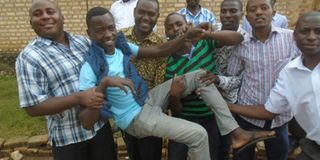Why 6,000 candidates failed to sit UCE examinations

Teachers lift a student who scored Agg 12 a past year’s UCE results. File photo
What you need to know:
- Dr John Chrysostom Muyingo, the minister of state for Higher Education, said the ministry is to use district education departments to trace the schools whose candidates missed the UCE exams so they are made to account for the absences.
- Mr Hamis Kaheru, the principal Uneb public relations officer, said a solution should be sought to solve the situation and that some head teachers should be tasked to explain the candidates’ absenteeism.
KAMPALA. Although a total of 323,276 candidates registered for the 2016 Uganda Certificate of Education [UCE] exams, 6,652 of the candidates did not turn up for the papers.
Mr Dan Odongo, the Uneb executive secretary, said the number of absentees is only two candidates fewer than those who did not appear for the UCE exams in 2015.
Ms Janet Museveni, the Education minister, who expressed concern over the high number of students who register but do not sit examinations, urged the ministry to probe the issue to establish the cause.
In 2015, there were 6,655 pupils who failed to turn up for exams while in 2014 the number was 4,229. In 2013, it stood at 6,756 candidates, and another 5,903 candidates in 2012.
While Uneb could not explain these missing numbers at the UCE exams, education experts point to poverty and low attitude towards education by most parents.
Causes
The former educationist-turned politician and former Budadiri East MP, Mr David Livingstone Kibale, attributed the absenteeism to family background and low attitude towards education.
“Many of these children come from homes where nobody inspires them and an entire family has a negative attitude towards education so they discourage children from continuing with education since nobody has achieved anything from school,” Mr Kibale said.
Mr Benson Kule, the commissioner for secondary education, blamed the no show at UCE on defilement, lack of school necessities, unfriendly school environment, and failure by some head teachers to register the students.
“Some boys drop out of school because they presume boda boda riding is better than schooling, while some have started [engaging in] betting and they earn quick money while girls may be forced to drop out once they start their menstrual cycles and there are no sanitary wears,” Mr Kule said. Mr James Tweheyo, the Uganda National Teachers Union (Unatu) general secretary, attributed the practice to the bad environment at schools, unfriendly teachers, and the desire to make quick money and poverty.
“Some students are being forced to drop out because they can’t afford the rising examination fees. Sometimes you find cases of parents who have sold every piece of land to pay tuition and when it comes to examination fees and tuition at the same time, the parents have nothing to sell and the alternative is to have the children out of school,” he explained.
Mr Tweheyo urged the Education ministry to act on schools whose candidates missed out on the UCE, adding that there are also incidences where a child sits at home even when he has registered for the exams.
“But there is also fear of exams by many students. I can’t also rule out that many parents have relegated the education of the child to teachers, yet they ought to make a contribution,” Mr Tweheyo said.
Mr Hamis Kaheru, the principal Uneb public relations officer, said a solution should be sought to solve the situation and that some head teachers should be tasked to explain the candidates’ absenteeism.
Dr John Chrysostom Muyingo, the minister of state for Higher Education, said the ministry is to use district education departments to trace the schools whose candidates missed the UCE exams so they are made to account for the absences.
“How can a student struggle for four years and miss out on the final papers? I blame this on the negligence of the parents who are ignorant of the value of education for their children and the community,” Dr Muyingo said.



